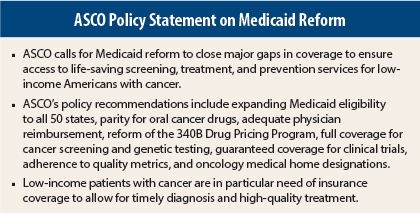ASCO issued its new Policy Statement on Medicaid Reform on November 17, which calls for major changes to the program to ensure access to high-quality cancer care for all low-income individuals. The Society’s recommendations call for Medicaid expansion in all 50 states to close coverage gaps, improve cancer screening and prevention services, and end coverage restrictions that prevent Medicaid enrollees from receiving high-quality cancer care, among others. The Policy Statement on Medicaid Reform is published in the Journal of Clinical Oncology.1
“People with cancer, for whom the costs of evaluation and treatment can be extraordinarily high, are particularly in need of insurance coverage to allow for timely diagnosis and high-quality treatment,” wrote statement authors Blase N. Polite, MD, MPP, of the University of Chicago, and colleagues. Currently, 67.9 million Americans are enrolled in Medicaid. Of them, an estimated 2.1 million beneficiaries, including those added under the Affordable Care Act, have had a cancer diagnosis, and many more depend on Medicaid for routine cancer screenings and prevention services. Twenty-seven states and the District of Columbia have already expanded their Medicaid programs under the Affordable Care Act, 21 have not, and the remaining 2 states are in “open debate.”
In releasing its policy statement, ASCO noted that the November midterm elections are unlikely to significantly change the outlook for state expansion under the Affordable Care Act. But other opportunities exist for improving access to cancer-related care among Medicaid beneficiaries, and unexpanded states, according to the ASCO policy statement, “should come up with an alternative strategy that provides comprehensive subsidized health coverage that ensures, among other benefits, access to high-quality cancer care, measured by cancer-specific quality metrics, delivered by a cancer specialist.”
Critical Health-Care Disparities
During a news conference announcing the policy statement, Peter Paul Yu, MD, FACP, FASCO, ASCO President and Director of Cancer Research at Palo Alto Medical Foundation, explained why ASCO has decided to issue recommendations for Medicaid reform.
“The evidence shows that uninsured patients are significantly more likely to be diagnosed with advanced cancer than are insured patients. Further, Medicaid’s low reimbursement rates are a disincentive for physician participation, making it increasingly difficult for patients to access care from specialists,” said Dr. Yu. “As oncologists, we believe it is our responsibility to advocate for policies that expand and improve the care of all people with cancer regardless of financial means. We also believe that no individual diagnosed with cancer should be without insurance that guarantees access to high-quality cancer care delivered by a cancer specialist. Therefore, patients with cancer who have Medicaid should receive the same timely and high-quality cancer care as patients with private insurance. Lastly, Medicaid payments should be sufficient to ensure that Medicaid patients have access to quality cancer care.
“For these and other reasons, ASCO strongly believes that the Society should, first, draw attention to the critical issues facing cancer patients under Medicaid and, second, make concrete, constructive recommendations for strengthening this program to assure that our most vulnerable citizens receive needed health care. The ASCO Policy Statement on Medicaid Reform is designed to achieve both of those objectives,” said Dr. Yu.
The recommendations ASCO presented in its policy statement offer several ways Medicaid could be reformed to expand access to cancer care and remove barriers to key elements of quality cancer care for enrollees. They include:
- Expanding insurance coverage for individuals below the federal poverty level in all 50 states
- Ensuring oral parity for patients with Medicaid coverage and including oral and intravenous cancer therapies, as well as supportive care medications, as exempt services for cost-sharing purposes
- Extending clinical trial participation included in the Affordable Care Act to patients with Medicaid coverage, and allowing patients to cross state lines to participate in those trials
- Eliminating artificial barriers between current Medicaid beneficiaries and newly eligible ones, and applying Affordable Care Act final-rule mandates for cancer screening and diagnostic follow-up without copay for all Medicaid beneficiaries
- Requiring coverage for genetic testing, without deductibles or copays, in any patient deemed at high risk for an inheritable cancer-risk syndrome
- Improving the 340B Drug Pricing Program to incentivize care for uninsured and underinsured patients regardless of care setting
- Eliminating variation between Medicare and Medicaid physician payment rates for cancer diagnosis and treatment by raising Medicaid payment to Medicare rates
- Tying state flexibility in running Medicaid programs to the requirement to meet predefined cancer quality metrics
- Allowing oncology practices to be designated as medical homes, and developing expanded reimbursement for care coordination and patient education for oncology practices ■
Disclosure: Coauthor Nefertiti C. duPont reported a consultant or advisory role with Genentech, honoraria from DySIS Medical, and research funding from Genentech.
Reference
1. Polite BN, Griggs JJ, Moy B, et al: J Clin Oncol. November 17, 2014 (early release online).



